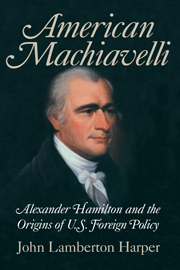Book contents
- Frontmatter
- Contents
- List of Illustrations
- Acknowledgments
- Miscellaneous Frontmatter
- Introduction
- PART I THE COMING OF NECESSITY
- PART II BATTLE LINES ARE DRAWN
- 3 At Washington’s Side Again, 1789
- 4 Hamilton versus the Virginians, 1789–1791
- 5 The Nootka Sound Crisis, Part One: The Morris Mission
- 6 Nootka Sound, Part Two: The View from New York
- 7 Liaisons Dangereuses, 1791–1792
- PART III SEIZING THE HELM
- PART IV INFORMAL ADVISER TO THE PRINCE
- PART V A PRINCE IN HIS OWN RIGHT?
- PART VI THE LESSER OF EVILS
- Conclusion: Hamilton Then and Now
- Notes
- Bibliography
- Index
6 - Nootka Sound, Part Two: The View from New York
Published online by Cambridge University Press: 05 April 2013
- Frontmatter
- Contents
- List of Illustrations
- Acknowledgments
- Miscellaneous Frontmatter
- Introduction
- PART I THE COMING OF NECESSITY
- PART II BATTLE LINES ARE DRAWN
- 3 At Washington’s Side Again, 1789
- 4 Hamilton versus the Virginians, 1789–1791
- 5 The Nootka Sound Crisis, Part One: The Morris Mission
- 6 Nootka Sound, Part Two: The View from New York
- 7 Liaisons Dangereuses, 1791–1792
- PART III SEIZING THE HELM
- PART IV INFORMAL ADVISER TO THE PRINCE
- PART V A PRINCE IN HIS OWN RIGHT?
- PART VI THE LESSER OF EVILS
- Conclusion: Hamilton Then and Now
- Notes
- Bibliography
- Index
Summary
Introduction
Angered by his discovery of Hamilton’s role at the outset of the Washington administration, Julian Boyd, the historian and long-time editor of Thomas Jefferson’s papers, prepared a dramatic exposé, Number 7: Alexander Hamilton’s Secret Attempts to Control American Foreign Policy. According to Boyd, George Beckwith was a “secret agent” (“7” being his code name for Hamilton, his mole inside the U.S. government), and Hamilton’s relationship with him constituted a story of intrigue and deceit. Hamilton either concealed his contacts with Beckwith or reported them in a way designed to advance aims in conflict with official policy. His disclosure to Beckwith of the purpose of military operations planned for the fall of 1790 – they were directed at the Shawnee and Miami tribes in the Maumee River Valley of Ohio, not the British-held post at Detroit – contributed to the embarrassing losses suffered by Brigadier General Josiah Harmar’s force of fifteen hundred men. With Hamilton’s “act of deception there opened a decade of divisiveness in the highest councils of the state.”
- Type
- Chapter
- Information
- American MachiavelliAlexander Hamilton and the Origins of U.S. Foreign Policy, pp. 74 - 87Publisher: Cambridge University PressPrint publication year: 2004

